
Introduction
RSV (Respiratory Syncytial Virus) Disease is a highly contagious respiratory illness that can affect anyone, but especially infants, young children, and elderly adults with weakened immune systems. The virus can cause various respiratory symptoms, ranging from mild cold-like symptoms to severe pneumonia. In some cases, RSV can be life-threatening. In this guide, we will provide a comprehensive overview of RSV Disease, including its causes, symptoms, treatments, and preventative measures. We’ll also highlight the impact of RSV Disease on public health and share practical tips and coping strategies for people affected by this disease.
Understanding RSV Disease: Causes, Symptoms, and Treatments
RSV is a type of virus that attacks the respiratory system, most commonly causing infections in the lungs. It is highly contagious and can spread easily through coughing, sneezing, and close contact with infected persons. The virus can also survive on surfaces for hours, increasing the risk of exposure.
Common symptoms of RSV in infants and young children include:
- Coughing
- Sneezing
- Runny or stuffy nose
- Fever
- Difficulty breathing or rapid breathing
- Wheezing
- Irritability and decreased activity level
In adults, RSV Disease typically presents as a cold-like illness, with symptoms such as coughing, sneezing, fever, and body aches. In certain cases, RSV can lead to more severe lung infections such as bronchiolitis or pneumonia.
It is important to note that RSV Disease can be more severe in infants, young children with underlying medical conditions, and elderly adults. If you or someone you know is experiencing symptoms of RSV Disease, it’s important to seek medical attention promptly.
There is currently no specific treatment for RSV Disease; however, medication and supportive therapy can help relieve symptoms and manage the illness. In severe cases, hospitalization may be required.
Keeping Your Family Safe from RSV: Prevention and Precautions
Prevention is key when it comes to RSV Disease. Here are some tips to help reduce the risk of contracting the virus:
- Wash your hands frequently with soap and water, especially before and after caring for a sick person
- Keep surfaces clean and disinfected
- Avoid close contact with sick people, particularly in crowded settings
- Cover your mouth and nose when coughing or sneezing, and dispose of used tissues promptly
- Avoid exposing infants and young children to cigarette smoke, which can increase their risk of RSV Disease
If a family member is diagnosed with RSV Disease, it’s important to take precautions to prevent the spread of the virus. These may include:
- Isolating the sick person from others within the household
- Frequent hand washing and use of hand sanitizer
- Disinfecting surfaces
RSV Disease: A Common Respiratory Illness in Children and Adults
While RSV Disease can affect anyone, infants and young children, especially those born prematurely or with underlying medical conditions, are at a higher risk of developing severe illness. In adults, RSV Disease tends to be less severe, with symptoms similar to a cold or flu.
It’s important to note that RSV Disease can be of particular concern for elderly adults, who may be more likely to develop serious complications as a result of the virus. In fact, RSV is a leading cause of respiratory illness in elderly adults and a common cause of hospitalization in this age group.
The Impact of RSV Disease on Public Health: Statistics and Research
RSV Disease is a significant public health problem, particularly for infants, young children, and elderly adults. According to recent studies, RSV is responsible for up to 5% of all deaths in infants under the age of 1 in some countries. It is also a leading cause of hospitalization in young children, with approximately 57,000 hospitalizations due to RSV Disease occurring annually in the United States alone.
Research is ongoing into the prevention and treatment of RSV Disease. There is currently no vaccine for RSV, but research is underway to develop one. Additionally, drug treatments and supportive therapies are being researched to manage the symptoms and severity of the illness.
Living with RSV Disease: Stories and Coping Strategies
Living with RSV Disease can be difficult, both for the person affected and their family members. Here are some tips for coping with RSV Disease:
- Seek medical attention promptly if someone in your family is experiencing symptoms of RSV Disease
- Follow the treatment plan provided by your healthcare provider
- Practice good hygiene habits to prevent the spread of the virus
- Stay home and rest if you or a family member is experiencing symptoms of RSV Disease
- Connect with support groups or online communities to share experiences and find emotional support
- Take care of your overall health by eating well, getting enough rest, and staying physically active (if appropriate)
Conclusion
RSV Disease is a serious respiratory illness that can affect anyone, but is particularly concerning for infants, young children, and elderly adults. The best way to prevent RSV Disease is through good hygiene practices and avoiding close contact with sick people. If you or someone you know is experiencing symptoms of RSV Disease, seek medical attention promptly. By taking steps to prevent the spread of RSV Disease and managing the illness effectively, you can help protect the health and well-being of yourself and your loved ones.




